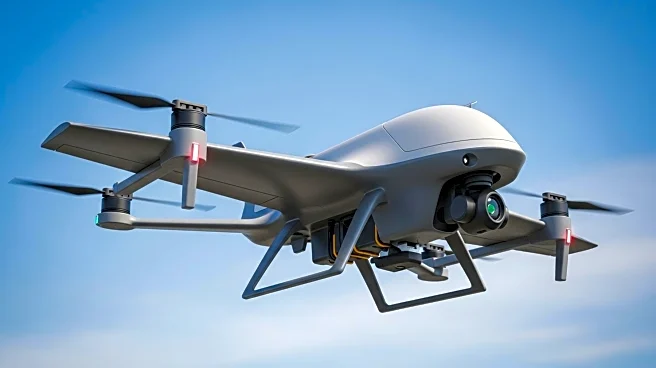What's Happening?
A Maryland-based startup, North American Wave Engine Corp., is advancing drone technology with its innovative wave engines. These engines, which operate without moving parts, are designed to be low-cost and capable of high speeds, making them suitable for mass production. The company has developed nearly 50 engines for various customers, including federal contractors, and is preparing to launch its latest drone model, the Scitor-P, for decoy and aerial target markets. The startup has secured a pre-order from a Department of Defense customer, highlighting the growing demand for affordable and efficient unmanned aerial vehicles (UAVs). The company, founded by Daanish Maqbool, has evolved from university research to a commercial enterprise, with a focus on defense applications.
Why It's Important?
The development of low-cost, high-speed drones is significant for the defense industry, which is increasingly relying on UAVs for various applications, including intercepting attack drones. The technology developed by North American Wave Engine Corp. offers a cost-effective solution that could enhance the military's capabilities in drone warfare. The company's wave engines, which are simpler and cheaper to produce than traditional jet engines, could lead to widespread adoption in both military and commercial sectors. This innovation not only addresses the need for affordable drones but also positions the company as a leader in the drone technology market, potentially influencing future defense strategies and procurement policies.
What's Next?
The company plans to continue refining its wave engine technology to expand its market reach beyond defense applications. Future versions of the engines are expected to be quieter, more efficient, and have longer lifespans, making them suitable for commercial use. As the company scales up production, it may attract more investment and partnerships, further solidifying its position in the UAV industry. Additionally, the Department of Defense's interest in boosting drone production could lead to increased orders and collaborations, driving further innovation and growth for the startup.
Beyond the Headlines
The ethical implications of drone technology, particularly in defense, are complex. While drones offer strategic advantages, their use raises questions about privacy, surveillance, and the potential for autonomous warfare. As the technology advances, regulatory frameworks and international agreements may need to evolve to address these concerns. Furthermore, the company's focus on low-cost production could democratize access to drone technology, impacting industries beyond defense, such as logistics and agriculture.











